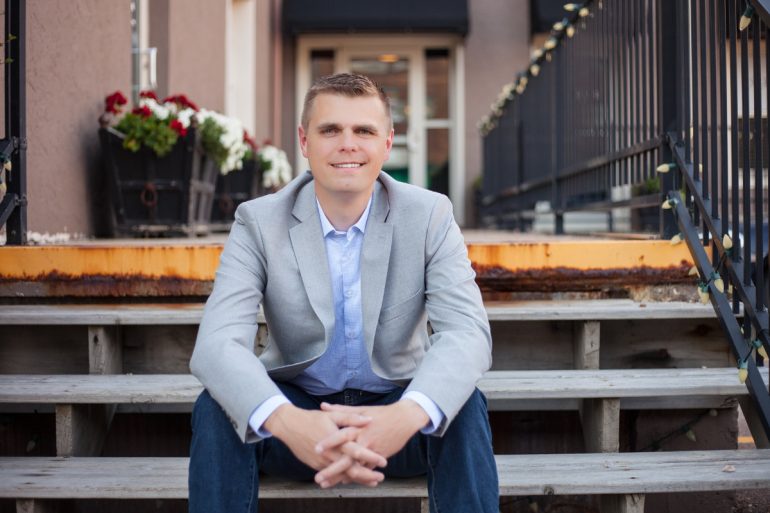As part of a regular series powered by Microsoft, BetaKit interviews prominent Canadian CTOs speaking earnestly on the biggest challenges they face in their role, as well as future technology predictions in their space.
As an artificial intelligence startup, you’re dealing with data. A lot of data. You need to take that data and deliver good products—and fast. This is what Canvass Analytics’ Steve Kludt told me as he explained what he’s been working on as the CTO of the three-year-old startup that automates artificial intelligence for IoT.
One of the issues Kludt identified early on as an AI startup was the speed at which the team was able to deliver. “We can’t build everything,” he said, recognizing that the scope of Canvass’ engineering team isn’t that of larger companies. “But we have to quickly respond to customers.”
“A lot of companies don’t think of themselves as an AI company, but there’s still a place for AI in your product.”
– Steve Kludt, CTO of Canvass Analytics
Canvass wasn’t originally built on a microservice architecture style, but Kludt said it quickly realized that’s where they needed to be in order to hit their goals. The team needed to deliver quality, bug-free products using large amounts of streaming data and needed to do so fast.
Microservices is an architecture style that emphasizes building each feature as its own product as opposed to having one main product with a number of features tacked on. Kludt and his team began transitioning to microservices as a way to deliver new product quickly. “We wanted to add a new feature — could we spin up a microservice that would do just that thing?”
“[It’s] more than just automating deployment,” Kludt said of the things Canvass needed to do to speed up product delivery. “It’s creating architecture where you can introduce new features without worrying that it’ll break something else.” The CTO indicated that moving to a microservice architecture allowed the team to do that.
“It makes it more complicated—there’s more moving pieces—but it makes you faster,” he said.
Now, all of Canvass Analytics runs on microservices.
Beware black boxes when predicting the future
When asked about the challenges he predicts in the future, Kludt laughed and recited a Bill Gates quote: “we always overestimate the change that will occur in the next two years and underestimate the change that will occur in the next 10.”
But one change that Kludt can predict, though it may not necessarily be a challenge, is the role of AI in tech. “A lot of companies don’t think of themselves as an AI company, but there’s still a place for AI in your product,” he said. Whether it’s HR software predicting if a candidate will be the right fit, or a design shop that leverages AI to get build a working prototype without developer involvement, Kludt argued that AI can offer companies the opportunity to become faster and more efficient.

In terms of the future of AI, Kludt spends a lot of his time learning wherever he can, and he’s noticed some disconnect between technology in general and AI. “It’s a lot easier to get from concept to solution,” he said of the rate at which technology has evolved. “There’s a higher expectation of fast delivery of solutions because there’s so much more tech available to do what you need.”
But despite its rise to the forefront of both consumer and venture funds’ minds, AI hasn’t evolved as quickly. “We rely on academia to produce concepts that can then be applied,” Kludt said, though he does expect we will see the rate of change in AI pick up in the future.
In the AI space, Kludt sees three areas that are beginning to get more attention: differential privacy for creating models that can’t be reversed engineered to reveal identities, the ability to transfer learning between models, and interpretation of the models.
“People up to this point have just accepted that deep neural nets or complex neural networks are black boxes and we don’t know what they do or why they do it, but that they just do it well,” Kludt said. “I think there’s going to be a push for understanding not only what the model is doing but how do I take what that model learned and apply back into my business?”
Focusing on differentiation
As a CTO, Kludt drives technology decisions within Canvass, and emphasized the need to identify what your core value your technology is built for and find ways to fill in the rest.
“Don’t manage your own databases, don’t build your own thing,” he said. “Leverage services and solutions for things you’re not trying to differentiate on.”
For anyone who is considering getting into a CTO role, Kludt encouraged them to, with one caveat. “Don’t become a CTO to be a CTO,” he said. “Make sure what you’re building is something you care about solving and a fun challenge for you.”
For more on Canvass Analytics, read Microsoft Canada’s interview with the Canvass Analytics team.


